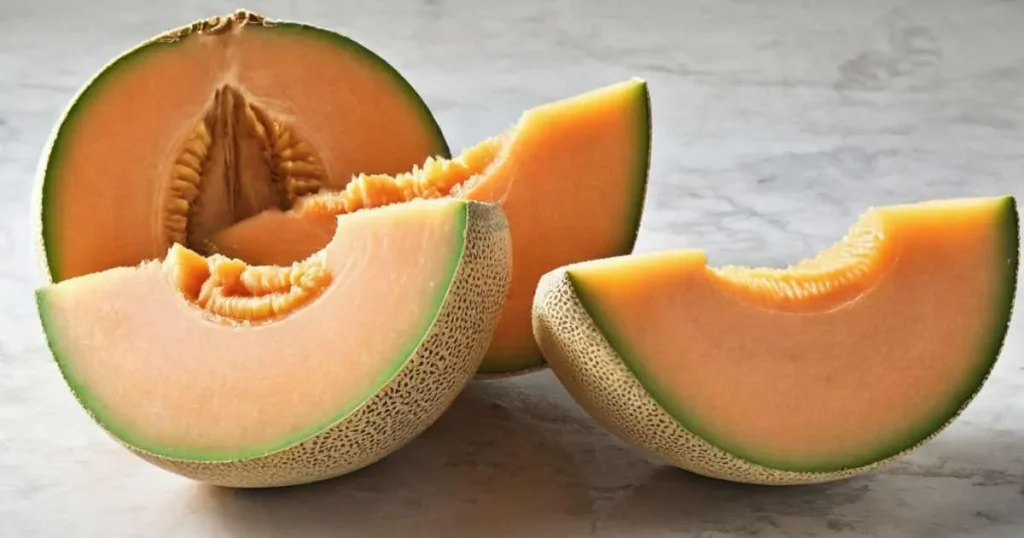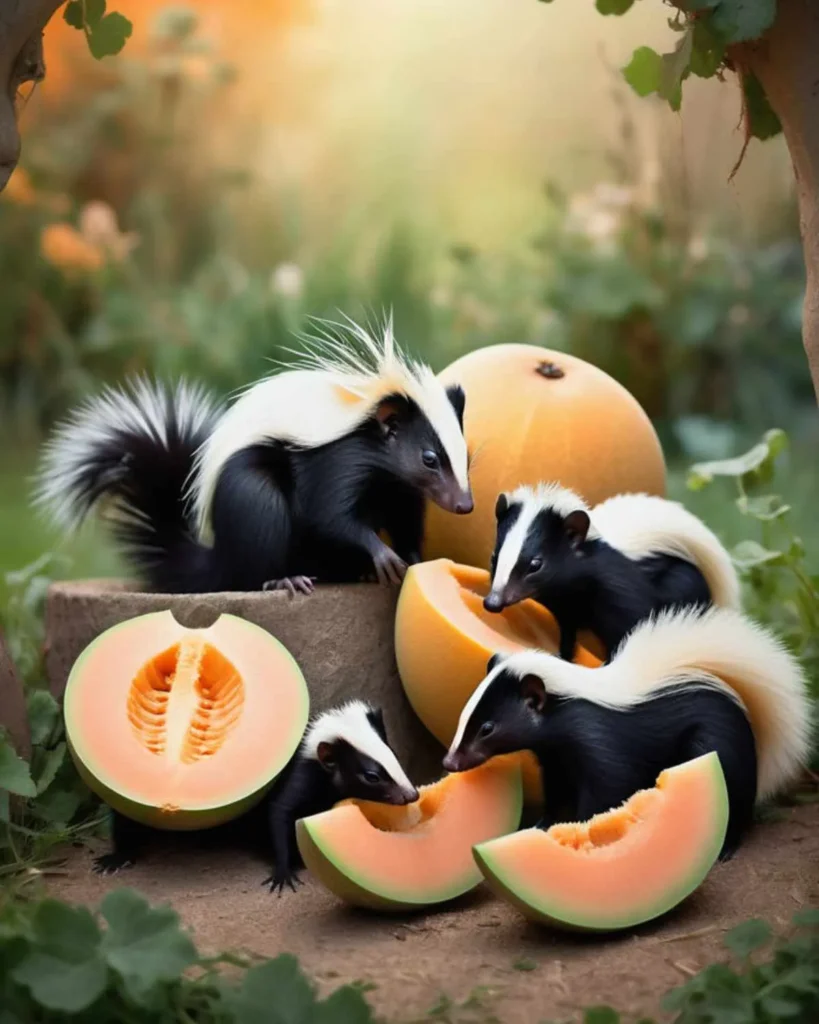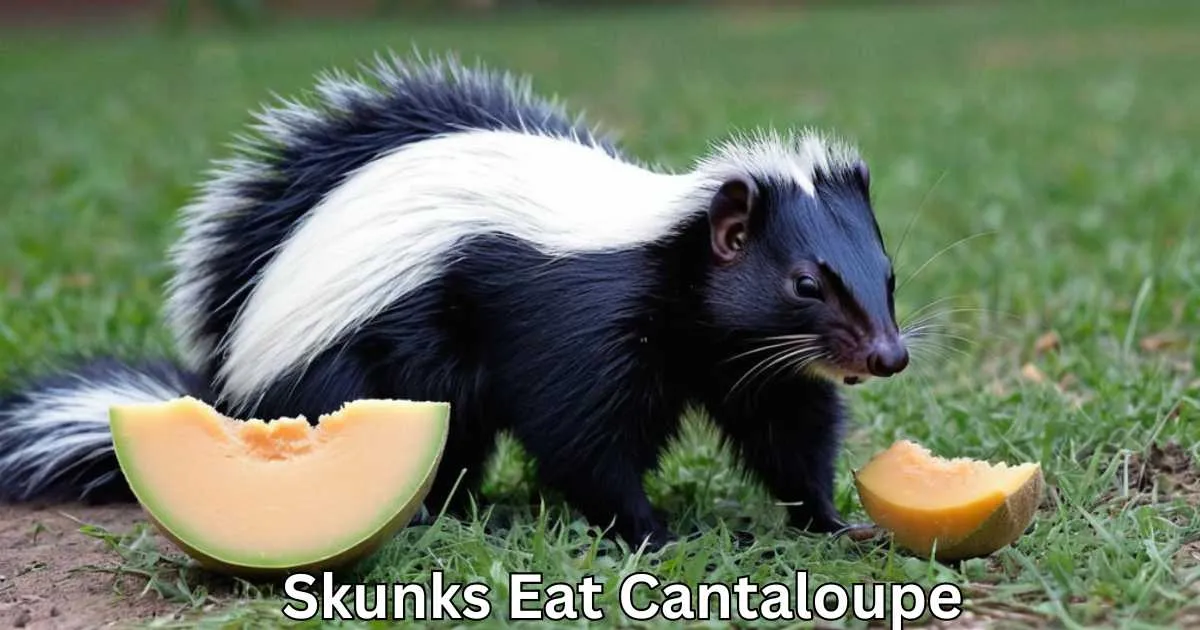Can Skunks Eat Cantaloupe? Yes, Here’s Why
Last updated on August 11th, 2024 at 07:32 am
Did you know skunks will happily munch on cantaloupe? As someone who cares for pet skunks and studies wildlife, I can tell you these omnivores have a wide-ranging diet that includes fruits like cantaloupe. If you want to learn more about what attracts skunks to your garden and how they can help the environment, stick around for some cool insights!
The Skunk’s Diet
What do skunks munch on during their nighttime scavenging? Many pictures a skunk with its striking black-and-white fur pattern, but few know about its varied eating habits. Skunks are surprisingly diverse eaters, and their diet might even include the sweet fruit of cantaloupe.
Natural Foraging Habits
Skunks have a reputation for their keen sense of smell, which they use to locate food. They forage at dawn and dusk for insects, grubs, and earthworms. Their natural diet includes:
- Berries
- Nuts
- Leaves
- Small rodents
Fruits like cantaloupe can also attract skunks when available in their habitat.
Omnivorous Appetites
| Foods | Type | Predominance in Diet |
|---|---|---|
| Plants and berries | Vegetation | Common |
| Insects and small animals | Protein | Regular |
| Cantaloupe and other fruits | Fruit | Occasional |
Skunks are omnivores, meaning they eat both plants and animals. They adapt their diet to what’s available. Fruits like cantaloupe provide a sweet treat and a hydrating snack. This versatility helps skunks survive in diverse environments.
Cantaloupe In The Wild
Skunks, known for their bold habits, often surprise us with their diet choices. One such surprise is the cantaloupe, a sweet melon that grows in the wild. While not a routine part of their diet, skunks can indeed enjoy a cantaloupe feast. This natural treat provides hydration and nutrients, which are beneficial, especially in their native habitats.

Seasonal Availability
Cantaloupes thrive in warm conditions and are most abundant in late summer months. Their growth period matches the skunks’ active seasons, potentially leading to delightful encounters amidst nature’s bounty.
| Month | Cantaloupe Availability |
|---|---|
| June | Starting to Ripen |
| July – September | Peak Season |
| October | End of Season |
Wildlife Consumption Patterns
As omnivores, skunks have a varied diet that may include fruits like cantaloupe. Wild cantaloupes can be a feast for some creatures if found. These are the animal diners that might relish cantaloupe in their environment:
- Skunks: Savor the juicy flesh of cantaloupes, often sought after for hydration.
- Raccoons: Notorious for being opportunistic eaters, raccoons too may indulge when available.
- Deer: Might nibble on cantaloupe gracing their path.
- Birds: Small birds peck at the soft flesh, relishing the sugary content.
Cantaloupe consumption in the wild depends on various factors like region, other food sources and the presence of humans.
Cantaloupe Appeal
The cantaloupe, with its tantalizing scent and luscious flesh, draws a variety of wildlife to gardens. Among these backyard visitors are skunks, who surprisingly show a distinct preference for the sweet melon. Discover why these black and white critters may sneak a bite of your cantaloupe.
Scent And Taste Attraction
Skunks possess a highly developed sense of smell, which leads them to ripe cantaloupes. The fragrant aroma of a cantaloupe signals freshness and ripeness, encouraging the skunk to investigate. Once they try a cantaloupe, the sweet taste often secures the melon a place in the skunk’s diet.
Nutritional Benefits For Skunks
Cantaloupes are not just tasty; they are also nutritious. The fruit offers several health benefits to skunks:
- Hydration: Cantaloupes contain a lot of water, which helps keep skunks hydrated.
- Vitamins: They are rich in vitamins A and C, which are essential for skunk health.
- Low Fat: The low-fat content is perfect for the skunk’s diet.
Skunks’ Feeding Strategies
Skunks are omnivores with a varied diet. They often surprise us with their unusual food choices. For instance, did you know skunks may eat cantaloupe? Let’s explore how these creatures find their meals.
Nocturnal Foraging
Skunks are active at night. They search for food when the world is dark. This helps them stay safe from predators. They use their keen sense of smell to locate food.
- Navigate using the stars.
- Sniff out food up to a mile away.
- Prefer quiet areas to avoid danger.
Food Source Investigation
Skunks are curious animals. They inspect many food sources. They check fruit like cantaloupe for:
| Freshness | Softness | Scent |
|---|---|---|
| Skunks love ripe food. | Soft fruits are easier to eat. | They are attracted by sweet smells. |
Once they find a good fruit, skunks will dig in. They use their front paws like hands. They tear into softer fruits like cantaloupe with ease.
Human-skunk Interactions
Skunks are most active at dusk and dawn, and sometimes they visit our backyards. As shy creatures usually avoid humans, accidental encounters can happen. They might come across our leftovers, like pieces of cantaloupe, while scavenging. These interactions impact both the skunks and the environment.
Backyard Encounters
- To minimize visits, secure trash cans and avoid leaving fruit outside.
- Light sensors can deter skunks.
- Skunks may mistake gardens for food sources.
- Close gaps under porches to prevent nesting.
Impact Of Human Foods On Skunk Behavior
Human foods can alter skunk behavior. Seeking easy meals, skunks might lose natural foraging skills. Foods high in sugar, such as cantaloupe, could lead to health issues for them.
| Food Type | Behavioral Impact | Health Impact |
|---|---|---|
| Fruits | Increase in daytime activity | Potential obesity |
| Human leftovers | Dependency on human sources | Digestive problems |
Balance is key for both skunks and our communities.
Mitigating Skunk Infestations
Have you ever spotted a skunk snacking in your garden? They may look cute, but skunks can be quite the little bandits, especially when they find something tasty like cantaloupe. To keep these striped visitors from turning your garden into their personal dining room, let’s explore effective ways to avoid unintentional dinners and deter furry gate-crashers.
Safe Food Disposal
Our first line of defense is safe food disposal. Skunks have a sharp sense of smell and can easily be lured by the scent of fresh or discarded fruit. It’s crucial to ensure that all your edible waste is securely tucked away.
- Compost Bins: Use bins with tight-fitting lids.
- Trash Cans: Opt for cans with locking mechanisms.
- Garden Debris: Clear it regularly to avoid skunk snacks.
Preventing Unintended Feeding
Next, we must prevent unintended feeding. A few simple adjustments can make your garden less inviting to skunks.
- Close gaps under decks or sheds where skunks may sneak in.
- Install motion-activated lights; skunks dislike bright areas.
- Keep your garden free of fallen fruit, including cantaloupe.
Implementing these strategies makes your space less attractive to skunks and helps safeguard your cantaloupe harvest!
Health Concerns For Skunks
Skunks, with their distinctive stripes and notorious defense mechanisms, require a balanced diet to stay healthy. Just like any pet, their eating habits can significantly impact their overall health. A poor diet in skunks can lead to numerous health problems, some of which may be serious.

Proper Diet For Captive Skunks
A skunk’s diet in the wild includes a variety of foods. These omnivores enjoy insects, small rodents, fruits, and plants. Captive skunks need a proper diet too, one that mimics this natural variety to meet nutritional needs.
- High-protein pet food specially formulated for skunks
- Fresh vegetables for vitamins and minerals
- Fruits like cantaloupe in moderation
- Calcium-rich foods to prevent bone issues
Ensuring a rich and varied diet is crucial for keeping your skunk healthy and preventing dietary deficiencies.
Risks Of Improper Feeding
Feeding skunks the wrong types of food or in incorrect amounts can pose serious risks. Their unique metabolism demands attention to detail when it comes to their meals.
| Food Type | Risk |
|---|---|
| High-fat foods | Obesity, heart disease |
| Excessive sweets | Dental problems, diabetes |
| Large amounts of fruit | Digestive issues |
Feeding them foods high in sugar, like too much cantaloupe, can lead to health issues. Striking the right balance in their diet is key to avoiding these risks.
Contributing To Skunk Conservation
Curiosity often piques when we ponder what creatures like skunks eat in the wild. Beyond their notorious defensive spray, skunks play crucial roles in our ecosystem, with diets that can include surprisingly diverse items, even foods like cantaloupe. Fostering skunk conservation ensures these unique animals continue to thrive, benefitting natural surroundings. Let’s dive into the roles skunks play and how we can support their habitats.
Understanding Skunk Ecosystem Roles
Skunks are often undervalued for their ecological contributions. They serve as pest controllers by eating harmful insects and rodents. Their varied diet helps keep ecosystems balanced. Feeding on fruits like cantaloupe, also aids in seed dispersion, encouraging plant diversity and growth.
Supporting Natural Habitat
Promoting a healthy habitat for skunks is vital. Integrating native plants into our gardens supports food sources for skunks and other wildlife. Ensuring safe nesting areas and foraging grounds helps protect skunk populations. We can help by avoiding chemicals in our yards to ensure a toxic-free environment. Conservation efforts focus not only on the animals themselves but also on the ecosystems they inhabit.
Frequently Asked Questions
What Food Is Toxic To Skunks?
Skunks should avoid chocolate, caffeinated substances, alcohol, onions, garlic, and salty or sugary foods as they are toxic to them.
What Is A Skunk’s Favorite Fruit?
Skunks often enjoy a variety of fruits, but they are particularly fond of berries such as blueberries and cherries. Their preference for fruit can vary by individual and regional availability.
Do Skunks Eat Cucumbers?
Yes, skunks can eat cucumbers. These omnivores have a diverse diet that includes various fruits and vegetables.
Conclusion
Wrapping up our curious foray into the dietary preferences of skunks, it stands clear: cantaloupe can indeed be on their menu. These adaptable critters aren’t picky eaters. While fruit isn’t their go-to snack, they won’t snub a juicy slice. So, should you find your melons missing, you might just know who the culprits are!

